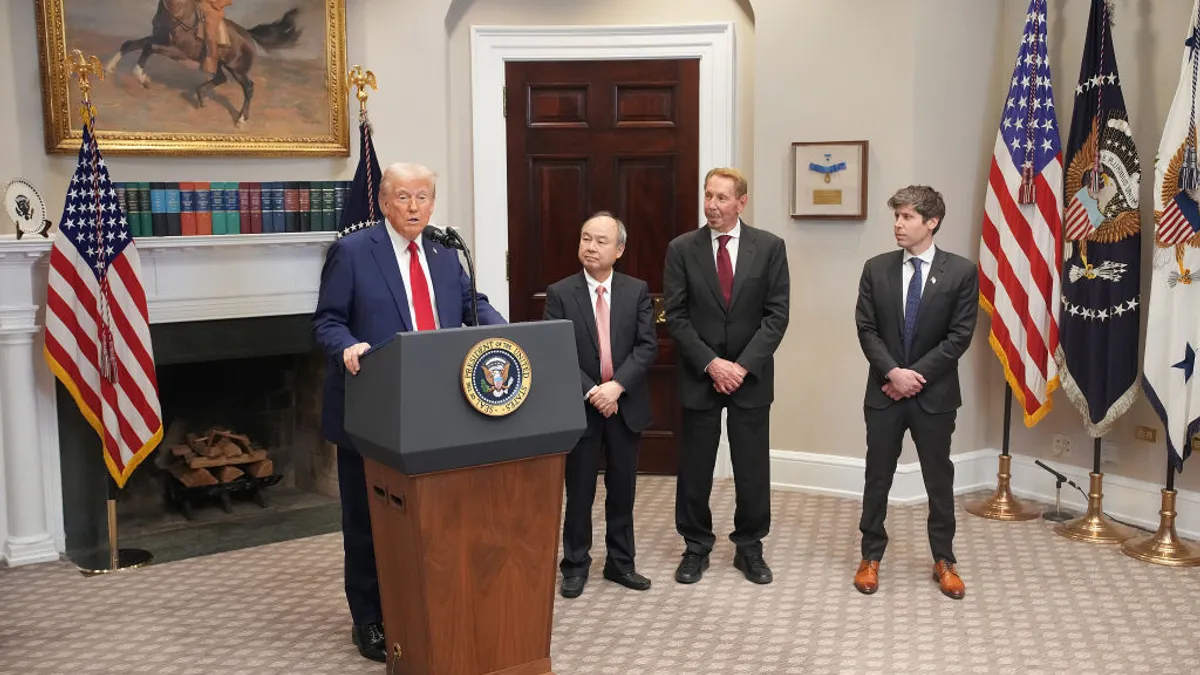WASHINGTON — On January 21, 2025, President Donald Trump unveiled what he described as a “monumental undertaking” in artificial intelligence, the Stargate Project, a $500 billion joint venture bringing together some of the leading companies in AI technology.
The project unites OpenAI, Oracle, SoftBank, Microsoft, Nvidia, Arm, and MGX, an AI investment group backed by Abu Dhabi’s sovereign wealth fund.
Trump called Stargate “the biggest AI infrastructure project by far in history, all taking place right here in America,” and credited his administration for facilitating the initiative.
Representatives from the participating companies Oracle executive chairman Larry Ellison, OpenAI chief Sam Altman, and SoftBank founder Masayoshi Son joined him for the announcement in the White House’s Roosevelt Room.
Stargate is described as a far-reaching effort to accelerate AI research and deployment in sectors ranging from healthcare to national security.
Ellison said the project would allow doctors in rural areas to access treatment plans from leading hospitals, while contributing to development of new medications, including potential cancer vaccines.
Son framed the initiative as a turning point for the U.S economy, declaring it “the beginning of the golden age in America.”
Altman emphasized the project’s scale, calling it “the most important project of this era” and acknowledging Trump’s role in enabling the collaboration.
While the venture promises sweeping technological advances, it has also prompted questions about competition and federal oversight.
Six of the world’s leading AI companies, often fierce competitors, are pooling resources, raising potential antitrust issues that some experts argue have not been sufficiently addressed.
Madhavi Singh, a Yale Law School researcher and deputy director of the Thurman Arnold Project, warns that Stargate may violate long standing competition laws.
In a forthcoming article for the Berkeley Technology Law Journal, Singh writes that the joint venture “merges competitors in a way that could flatten competition and reduce innovation.”
“The administration has shifted from rigorous enforcement of the Sherman and Clayton Acts toward a light touch regulatory approach,” Singh said in a phone interview.
She added that the federal government’s backing of the project may shield it from investigation, while officials frame it as a strategic effort to counter China and protect national security.
Some legal analysts express concern that combining AI industry leaders in a single venture could limit choices for consumers and businesses, much like historical industrial cartels.
“The worry is not the technology itself, but the market power it creates,” said David Thompson, a competition law scholar at Georgetown University. “When rivals collaborate at this scale, there’s a real risk of higher prices and less innovation.”
The scale of Stargate is unprecedented. The $500 billion investment exceeds the combined budgets of several major federal infrastructure projects, including the US Interstate Highway System and NASA’s Artemis program.
Comparable collaborations in other sectors, such as the auto industry, have historically triggered antitrust scrutiny when competitors coordinated manufacturing or supply chains.
A review of previous large scale tech joint ventures shows that government support can complicate enforcement.
Analysts note that federal backing may be used to justify mergers or collaborations that would otherwise face legal hurdles, citing cases in defense and energy sectors where national interest was invoked to approve deals.
Local officials in Texas, where Stargate’s largest facilities will be located, welcomed the project. “This is a once in a generation opportunity for our workforce and economy,” said Rep.
Susan Cortez, whose district hosts a major Stargate site. “We are excited about the jobs and innovation this brings to our communities.”
However, some industry insiders express caution. A Silicon Valley AI researcher, speaking on condition of anonymity, said, “Pooling talent and funding at this scale can accelerate research, but it can also stifle competition.
There’s a fine line between collaboration and creating a monopoly.” Even prominent figures outside the venture have criticized the initiative.
Elon Musk, then working with Trump in the White House, posted on X questioning whether the companies “really have the money” to fund the project and ridiculed the $500 billion figure.
Stargate’s impact will likely unfold over several years. Advocates argue the collaboration will accelerate breakthroughs in AI applications, national defense, and healthcare.
Critics caution that combining so many competitors under one initiative could reshape the market, concentrating power and reducing competitive pressure.
Legal scholars emphasize monitoring the venture closely. Singh said, “Even if it’s framed as a strategic national project, the fundamental competition concerns remain.
Future enforcement decisions will set precedents for how AI collaborations are regulated globally.” The Stargate Project represents an unprecedented collaboration among AI industry leaders, backed by the federal government and aimed at establishing US leadership in the field.
While the potential technological and economic benefits are significant, the joint venture has sparked debate among legal experts about antitrust compliance and market effects. Observers will be watching closely to see whether the initiative promotes innovation or constrains competition.
